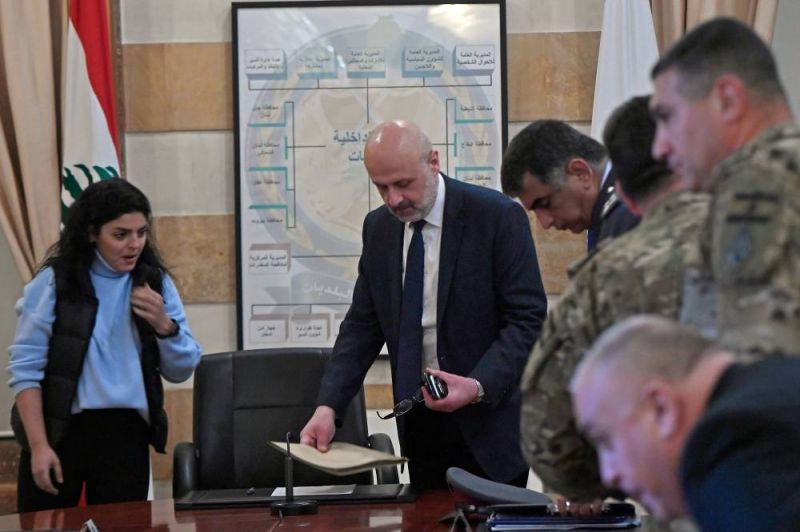
Caretaker Interior Minister Bassam Mawlawi yesterday announced an end-of-year security plan “to preserve security during the holiday season.” (Credit: Hussam Shbaro)
Want to get the Morning Brief by email? Click here to sign up.
Parliament is scheduled to convene today for its 10th and final attempt of 2022 to elect a president. “There will be more serious work starting next year,” Deputy Parliament Speaker Elias Bou Saab said yesterday, apparently unhopeful about today’s session as Free Patriotic Movement and Lebanese Forces reticence sank a second proposed dialogue session on the next head of state. Parliament has consistently failed to reach consensus on a candidate, with previous electoral sessions resulting in votes split between frontrunner Zgharta MP Michel Moawad and blank or protest ballots (including unlikely candidates, political slogans and witticisms). Last Thursday’s electoral session marked the first voluminous shift in voting outcome as the Free Patriotic Movement, while remaining undecided on a candidate, did not cast blank ballots as they had repeatedly done at previous sessions alongside Hezbollah and their allies. The FPM’s move indicated tense relations between the two parties after Hezbollah condoned a caretaker cabinet meeting that the FPM boycotted.
Banque du Liban yesterday announced that it will, as of February 2023, use its Sayrafa exchange platform rate to supply state power provider Electricité du Liban with “fresh dollars,” as the lira sunk to a new nadir of LL43,000 on the parallel market. EDL in October announced the first increase to its tariffs in nearly 30 years. The new electricity tariffs are billed in dollars and collected in lira at the Sayrafa rate. The BDL measure aims to allow the state power provider to finance fuel imports, for which the central bank recently approved conditional credit requiring the implementation of tariff hikes to ensure its repayment. Some areas’ overdue bills, however, are “very late,” an EDL source previously told L’Orient Today.
Caretaker Interior Minister Bassam Mawlawi yesterday announced an end-of-year security plan “to preserve security during the holiday season.” The plan involves a widespread deployment of security personnel, namely the “Interior Security Forces, the Beirut police, gendarmerie units, mobile units and the judicial police,” among whom “522 officers and 7,690 agents” will be stationed outside “391 churches.” Mawlawi additionally announced a crackdown on firearms, including a “ban on carrying weapons during the holidays” and preventive measures against celebratory gunfire and stray bullets, especially in “the perimeter of the [Beirut] airport.” Beirut MP Paula Yaacoubian in November called for an “end to loose weapons and stray bullets” after her flight was hit by a bullet while it was landing at Beirut’s Rafik Hariri International Airport — it was not the first incident in which gunfire jeopardized air traffic. Unregulated possession of firearms continues to endanger citizens across Lebanon. On Monday, a gunman shot a man to death in Tripoli, apparently over a traffic dispute, while a “sustainable” security plan responding to deadly incidents in the area was coming into effect.
The price of pharmaceuticals produced in Lebanon will increase, the Union of Drug Manufacturers in Lebanon said in a statement yesterday. The union claimed the measures would “prevent shortages,” citing “financial deterioration and dwindling [central bank] reserves.” According to the statement, drugs that cost between LL199,000 and LL399,000 will experience an increase between LL6,000 and LL180,000. Prices of drugs sold between LL400,000 and LL1,450,000 will increase by margins of LL181,000 to LL1,000,000. The statement did not specify when the price hike will go into effect. Since the beginning of the economic crisis, Lebanon has experienced several episodes of drug shortages, amplified by the depreciation of the local currency, illegal storage of medicines and the tightening of Banque du Liban's conditions for subsidizing medical products' imports. Cancer patients protested medicine shortages in October while pharmacists’ syndicate head Joe Salloum cited drug hoarding and black marketeering as driving shortages. The Health Ministry lifted subsidies on drugs last year in an effort to increase their availability.
The European Union has allocated €229 million to “reinforce much needed reforms and economic development” in Lebanon this year. In a statement announcing the aid, the EU cited among its priorities the uplifting of public institutions, ensuring gender equality, promoting sustainability and providing social protection to “vulnerable Lebanese and Syrian refugees.” The statement ties public administration reforms to demands mentioned in an International Monetary Fund staff-level agreement that was signed with Lebanon in April and sets conditions for the receipt of a multibillion dollar aid package.
In case you missed it, here's our must-read story from yesterday: “For journalists, activists, digital privacy is an uphill struggle”
Compiled by Abbas Mahfouz
